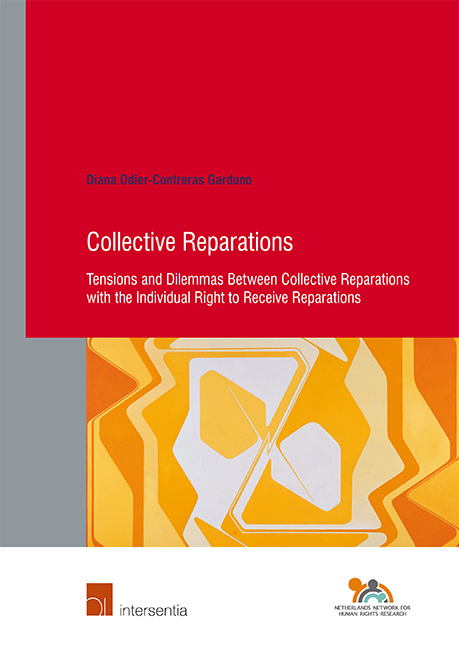 Collective Reparations
Collective Reparations Book contents
- Frontmatter
- Acknowledgments
- Table of Contents
- Abbreviations
- Chapter I Introduction
- Chapter II Developments Concerning the Right to Reparation
- Chapter III Collective Reparations at the Inter-American Court of Human Rights
- Chapter IV Collective Reparations in International Criminal Law
- Chapter V Collective Reparations & Non-Judicial Bodies
- Chapter VI Conclusions
- Samenvatting
- Resumen
- Résumé
- Bibliography
- Table of Instruments
- Table of Cases, Decisions and Filings
- Curriculum Vitae
- Human Rights Research Series
Chapter VI - Conclusions
Published online by Cambridge University Press: 31 January 2019
- Frontmatter
- Acknowledgments
- Table of Contents
- Abbreviations
- Chapter I Introduction
- Chapter II Developments Concerning the Right to Reparation
- Chapter III Collective Reparations at the Inter-American Court of Human Rights
- Chapter IV Collective Reparations in International Criminal Law
- Chapter V Collective Reparations & Non-Judicial Bodies
- Chapter VI Conclusions
- Samenvatting
- Resumen
- Résumé
- Bibliography
- Table of Instruments
- Table of Cases, Decisions and Filings
- Curriculum Vitae
- Human Rights Research Series
Summary
Reparation The action of restoring something to a proper or former state; spiritual restoration; the action of making amends for a wrong or loss; compensation for war damage by a defeated state. What it cost no one is telling. Can't subtract what might have been. Can't add up to a sum we understand. Can't subdivide what once was seen. Can carve a tombstone for the dead, memorialise with flowers and crosses, exhume a body, clear a name, issue receipts for wrongs and losses. But can't repair, and can't restore an uncut arm, unbruised genital, untroubled sleep, unscarred face, unweeping mother, children, faith
Introduction
The primary aim of this research was to assess the interplay and compatibility of the individual right to receive reparations with the increasing trend to grant collective awards in the context of gross violations of human rights. While the discourse surrounding the right of all victims of crime, including those of GVHR, to receive reparations clearly establishes that victims are entitled to collective measures in addition to individual reparations, in practice collective measures are rarely awarded in a supplementary manner. Instead, when addressing the harm caused by gross violations of human rights, judicial and non-judicial bodies tend to award victims only collective reparations. In this light, the main research question of this book was:
What are the tensions between the individual right to receive reparations and awarding collective reparations for victims of gross violations of human rights?
This research analysed the understanding of collective reparations by judicial and non-judicial bodies within three frameworks, namely international human rights law, international criminal law and a selection of transitional justice processes. In conducting such an analysis, as justified in the methodology section of the introductory chapter, the research was limited to studying specific case law from the IACtHR, the ICC and the ECCC. Additionally, the practices of non-judicial mechanisms were examined, specifically those of the Peruvian and Moroccan Truth Commissions and of two mass claims compensation commissions (the UNCC and the EECC). In the course of its inquiry, this research included an examination of the definition, scope and characteristics of collective reparations, as well as their legal foundations and the major challenges faced by their implementation. This final chapter will begin by summarising the general findings of the book based on each chapter's individual conclusions.
- Type
- Chapter
- Information
- Collective ReparationsTensions and Dilemmas Between Collective Reparations and the Individual Right to Receive Reparations, pp. 313 - 334Publisher: IntersentiaPrint publication year: 2018
